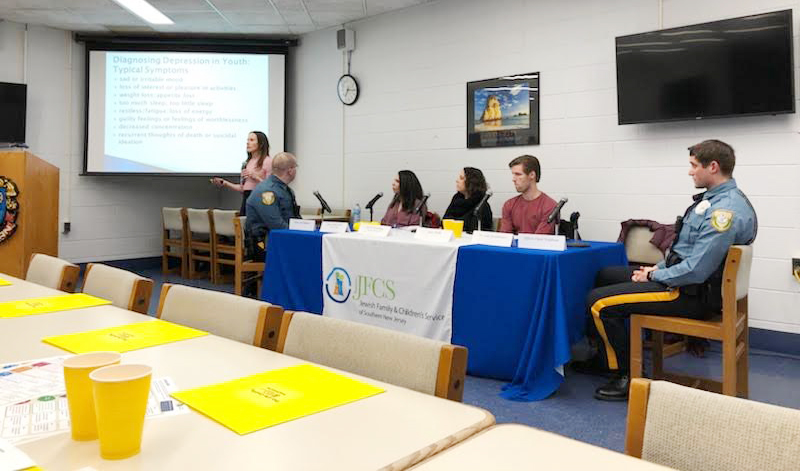This Life Counts shows the importance of looking out for suicidal behavior
Panelist Leah Rosenkrantz speaks about diagnosing depression in youth at This Life Counts
For those between fifteen to twenty-four, suicide is the second leading cause of death. Behind that at third, is homicide.
Such sobering statistics brought This Life Counts, a suicide awareness program, to the Susan McGongall Learning Center on March 7th. It was sponsored by Jewish Family and Children Services (JFCS).
There were many other important stats and facts presented. Many of them about depression.
Depression, a mental health disorder, affects a countless number of people. This disease can affect an individual’s moods and behaviors. When undiagnosed or untreated, depression can lead to suicide. Ninety percent of people with thoughts of suicide have a brain disease.
The attendees learned many of the symptoms that people with depression possess, including losing pleasure in activities, appetite/weight loss, loss of energy, feelings of guilt/unworthiness, and recurring thoughts of death.
Parents learned warning signs to tell if their child has depression. Those include isolating themselves from family and friends, “feeling like a bad person”, showing irresponsible behavior, experiencing a drop in their grades, or having somatic complaints.
Risk factors of suicide include a family history of suicide, access to lethal methods, substance abuse, history of depression, exposure to death, and stressful life events.
The panelists at This Life Counts stressed that those who experience depression should seek help immediately, whether it is through therapy or medication. One panelist, Leah Rosenkrantz, talked about how people try to hide their feelings and how important it is to for them to get assistance. “The most dangerous thing we have is the fear of the truth,” she said.
The program also featured a speaker, Lucas Wolfe. Wolfe was just a regular guy, who had no idea depression was an illness. During his junior year of high school, he started to feel empty. He also talked about feeling two sides, an angel and a devil was on his shoulder.
“It was like I had a war with myself, my depressed side and my normal side,” he said. When his “depressed side won out,” he “turned off.”
Wolfe told himself it was a phase and that he would get out of it, but he never did.
This continued throughout his college career. One day, when he, his father, and his brother were waiting in line at the food concessions at a Penn State game, Wolfe told them that he would be right back. He wanted to see if he could spot his father’s apartment from the balcony of the stadium. Up there, he looked upon the campus and imagined his future at Penn State, but he had “turned off” and had said he never wanted to jump so bad.
Still, Lucas pushed his illness under the rug and blamed it on other things, like school. He felt that success equaled value.
During his senior year, when his feelings got worse as he shut down physically and couldn’t eat or sleep. He constantly felt sick. Finally, Lucas’s parents realized he needed help and he went to a therapist.
His therapist helped him understand the science of depression and supplied him with medicine, which brought him great relief. “I took the anti-anxiety medicine, and I felt normal. I forgot how amazing it felt to feel normal,” he said.
Wolfe feels that having faith and hope made the difference, giving him a second chance. “If you see someone struggling, reach out, because we should always have the chance at a rich wonderful life,” he concluded.
After, the panelists took time to talk about protection. They recommended that kids with suicidal thoughts should spend time with their family and in the community.
The most important aspect of This Life Counts was the ask, listen, tell portion. The panelists spoke about asking a person with suicidal thoughts questions like, “I have been feeling concerned about you lately, how are you feeling?” or “Are you thinking about hurting/killing yourself?” When you ask these questions, you should listen to the person’s answers by using open body language and active listening. Finally, you can tell someone that the person is feeling suicidal. There are many people and contact numbers to access.
The Voorhees police also spoke at this program. They said they are available twenty-four seven and that they will be the first people to contact for help. “We might seem aloof,” said Officer Chase Waldman, “ but at the end of the day, we are focused on people’s safety.”
This Life Counts had a big impact on children and adults alike. Gail David, a spectator, thought Lucas’s program was the most beneficial.
“He gave me the feeling of what depression feels like,” she said. “To hear his story and to see exactly what he was feeling, that’s a hard thing to describe. Just from listening to how he felt, I think if I were to talk to someone who felt that way, I might pick up on something.”
Eva, an 11-year Voorhees Middle School student got a lot out of the program as well. “I think it’s really important, with social media being powerful, to spread awareness,” she said.
Eva also advises people to be happy with themselves and don’t let anyone change you. “Don’t try to do anything to make yourself feel more happy,” she said.


